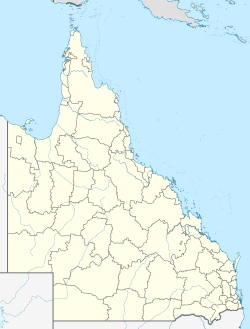Farnborough, Queensland
 From Wikipedia - Reading time: 7 min
From Wikipedia - Reading time: 7 min
| Farnborough Queensland | |||||||||||||||
|---|---|---|---|---|---|---|---|---|---|---|---|---|---|---|---|
| Coordinates | 23°01′37″S 150°45′41″E / 23.0269°S 150.7613°E | ||||||||||||||
| Population | 469 (2021 census)[1] | ||||||||||||||
| • Density | 3.171/km2 (8.213/sq mi) | ||||||||||||||
| Postcode(s) | 4703 | ||||||||||||||
| Area | 147.9 km2 (57.1 sq mi) | ||||||||||||||
| Time zone | AEST (UTC+10:00) | ||||||||||||||
| LGA(s) | Shire of Livingstone | ||||||||||||||
| State electorate(s) | Keppel | ||||||||||||||
| Federal division(s) | Capricornia | ||||||||||||||
| |||||||||||||||
Farnborough is a coastal rural locality in the Livingstone Shire, Queensland, Australia.[2] In the 2021 census, Farnborough had a population of 469 people.[1]
Geography
[edit]Farnborough is the northernmost extent of the Capricorn Coast.[3]
Farnborough's eastern boundary is a 17 km long beachfront onto the Coral Sea. However, the principal access to the beach is via Bangalee, a small beachside locality within Farnborough. In the southern part of Farnborough, there are a number of large rural residential blocks. Most of the northern part of Farnborough is occupied by the Capricorn International Resort which includes a golf course. The northernmost tip of Farnborough is a mixture of Crown land and the Byfield National Park.[4]
History
[edit]The short-lived sugar industry on the Capricorn Coast commenced in Farnborough. William Broome who had property a few kilometres north of Yeppoon established the Yeppoon Sugar Company in 1883. Having attracted investors, he built a sugar crushing mill in Farnborough (23°04′45″S 150°44′12″E / 23.0791°S 150.7368°E). Broome did not grow sugarcane himself and relied on others to grow it. As good prices were paid for sugar at that time, sugar cane plantations were developed at Farnborough and also at Cawarral and Joskeleigh.[5]

In 1889, there was a bad growing season and insufficient sugarcane was grown to make the mill profitable. The banks foreclosed, and the business was taken over by the company's Rockhampton backers. They auctioned it promptly at a significant loss to two of the mill's former shareholders. In 1891 Rutherford Armstrong became the manager and trebled production over several good seasons.[6]
In 1902, a failure of the sugar crop led to no crushing occurring at the mill which closed in 1903.[5][7]
Farnborough Provisional School opened on 9 June 1903. On 25 March 1913, it became Farnborough State School.[8]
In 1971, a Japanese syndicate headed by Yohachiro Iwasaki acquired hundreds of thousands of hectares of beachfront land including wetlands in Farnborough to build a resort. The acquisition caused widespread outrage, given that Australian citizens and developers had been refused to buy the land on several occasions prior, and also due to the belief that the deal was corrupted by kickbacks at the Queensland Government level.[9] Anti-Japanese sentiment ran rife including the printing of fake money featuring Mr Iwasaki's caricatured face with a currency value of 4 Grabs, a play on the term "up for grabs". When construction began, the Yeppoon RSL club posted an anti-Japanese display on their lawns. Local discontent reached its climax on 29 November 1980, the day of the Queensland Election, when a bomb was set off at Iwasaki Resort. Two men were charged but acquitted.[10] The project continued regardless. Originally known as the Iwasaki Resort, it later became the Capricorn International Resort. Rydges managed the resort until 2011, when the lease was taken over by Mercure.[11]
Demographics
[edit]In the 2016 census, Farnborough had a population of 476 people.[12]
In the 2021 census, Farnborough had a population of 469 people.[1]
Education
[edit]Farnborough State School is a government primary (Prep-6) school for boys and girls at 8 Hinz Avenue (23°04′35″S 150°44′14″E / 23.0763°S 150.7371°E).[13][14] In 2018, the school had an enrolment of 310 students with 19 teachers (17 full-time equivalent) and 15 non-teaching staff (10 full-time equivalent).[15]
See also
[edit]References
[edit]- ^ a b c Australian Bureau of Statistics (28 June 2022). "Farnborough (SAL)". 2021 Census QuickStats. Retrieved 28 February 2023.
- ^ "Farnborough – locality in Livingstone Shire (entry 48631)". Queensland Place Names. Queensland Government. Retrieved 27 December 2020.
- ^ "Capricorn Coast – district (entry 6158)". Queensland Place Names. Queensland Government. Retrieved 6 April 2017.
- ^ "Queensland Globe". State of Queensland. Retrieved 12 July 2017.
- ^ a b "The Yeppoon Sugar Company". Central Queensland History. Archived from the original on 13 July 2017. Retrieved 13 July 2017.
- ^ "Sugar in Central Queensland". The Queenslander. Vol. XLIX, no. 1056. Queensland, Australia. 18 January 1896. p. 120. Retrieved 13 July 2017 – via National Library of Australia.
- ^ "CENTRAL QUEENSLAND INDUSTRIES". The Brisbane Courier. Vol. LIX, no. 13, 917. Queensland, Australia. 20 August 1902. p. 8. Retrieved 13 July 2017 – via National Library of Australia.
- ^ Queensland Family History Society (2010), Queensland schools past and present (Version 1.01 ed.), Queensland Family History Society, ISBN 978-1-921171-26-0
- ^ Vivani, Nancy (1980). The Iwasaki Tourist Development at Yeppoon. Griffith University Brisbane.
- ^ "Two Inquiries into Iwasaki Evidence". Sydney Morning Herald. 14 July 1981.
- ^ "Mercure Makeover for Capricorn Resort Yeppoon". Capricorn Enterprise. 6 October 2011. Archived from the original on 26 April 2012. Retrieved 25 December 2011.
- ^ Australian Bureau of Statistics (27 June 2017). "Farnborough (SSC)". 2016 Census QuickStats. Retrieved 20 October 2018.
- ^ "State and non-state school details". Queensland Government. 9 July 2018. Archived from the original on 21 November 2018. Retrieved 21 November 2018.
- ^ "Farnborough State School". Retrieved 21 November 2018.
- ^ "ACARA School Profile 2018". Australian Curriculum, Assessment and Reporting Authority. Retrieved 28 January 2020.
External links
[edit]- "The Farnborough Sugar Mill". Livingstone Shire Council. Archived from the original on 13 July 2017. Retrieved 13 July 2017.
 KSF
KSF